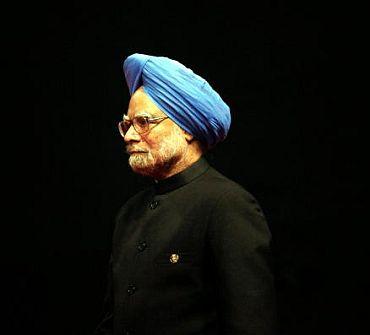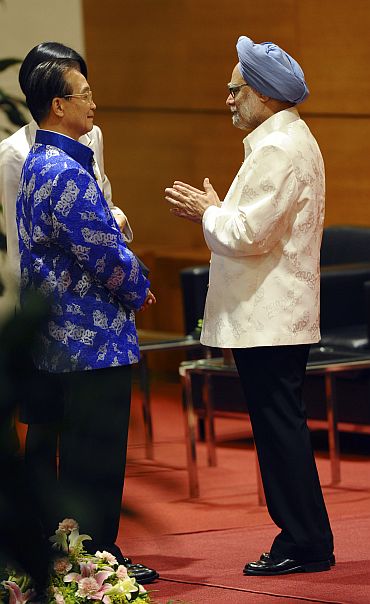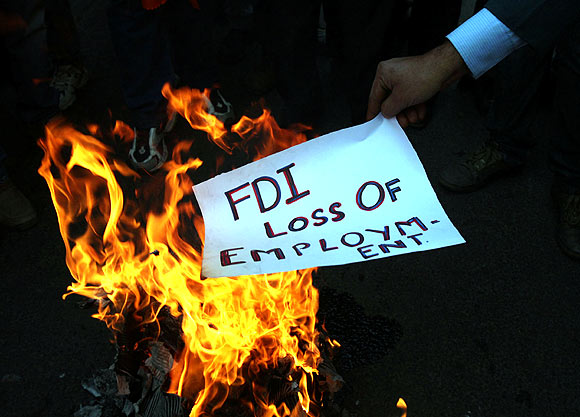Harsh V Pant
The government's perpetual inability to set its own house in order has not only cost India crucial foreign investment but has also damaged the perception about India's ability to play a larger role in global politics, says Harsh V Pant.
This has been an interesting year for India. Even as the rest of the world continues to acknowledge India's rise to global prominence, the Indian story of the last decade seems to be grinding to an abrupt halt. The world is pushing India to widen its horizons.
Earlier this year during her visit to India, the United States Secretary of State, Hillary Clinton, said, "We are betting on India's future...that the opening of India's markets to world will produce a more prosperous India and South Asia. We are betting that India's vibrant pluralistic society will inspire others to follow a similar path of tolerance. We are making this bet not out of blind faith but because we have watched your progress with great admiration."
She then went on to exhort India to lead suggesting that "India's leadership will help to shape positively the future of the Asia Pacific. That's why the United States supports India's Look East policy, and we encourage India not just to look east, but to engage east and act east as well."
...
Growing demand in Asia that India expand its footprint
Image: China's Premier Wen Jiabao talks to Prime Minister Manmohan Singh before a gala dinner in HanoiPhotographs: Hoang Dinh Nam/Pool/Reuters
It is not merely the US but other smaller states in Asia-Pacific too have made their intention clear of viewing India in a different light. There is a growing demand in Asia today that India should expand its footprint. It was reflected in the visits of leaders from Vietnam and Burma to India this year, as they sought to re-evaluate the foreign policies of their respective nations and in particular reduce their dependence on China.
After years of complaining that India does not exhibit a concerted will to power – so crucial in the geopolitically murky landscape of East Asia – regional states are now recognising, albeit tentatively, that India still remains their best bet as they seek strategic balance in a region that has been transformed by the rapid ascent of China.
China is too big and too powerful to be ignored by the regional states. But it is clear that regional states are now seeking to expand their strategic space by reaching out to other regional and global powers. Smaller states in the region are now looking to India to act as a balancer in view of China's growing influence and America's anticipated retrenchment from the region in the near future, while larger states see it as an attractive engine for regional growth.
Neither India nor the regional states in East Asia have any incentive to define their relationship in opposition to China. But what they are certainly interested in is leveraging their ties with other states to gain benefits from China and to bring a semblance of equality in their relationships. It certainly remains to be seen if India can indeed live up to its full potential, as well as to the expectations of external actors.
But it is indeed disconcerting that at a time when New Delhi should be rightfully reclaiming its leadership role in the region and beyond, the Indian government is paralysed to the point of looking like a lame duck government to outsiders. The Indian growth story is in trouble and a government that is led by an economist certainly recognises the challenges it faces.
...
'India biggest let down of the four BRIC states'
Image: An activist of Shiv Sena burns a pamphlet during a protest against FDI in retail sectorPhotographs: Reuters
But there is no will to take tough decisions and follow them through. Jim O'Neill, the Goldman Sachs economist who coined the term BRIC (Brazil, Russia, India and China) a decade back, is now talking of India as being the biggest let down of the four BRIC states arguing that India's inability to attract foreign investment could actually lead to a balance of payments crisis. The Indian rupee is falling, foreign direct investment is drying up, growth is plummeting, and deficits are rising.
And yet the Indian political establishment remains rudderless. The corruption scandals of the past year have sapped any will to take tough decisions. It is hard to believe that this is the government that won a mandate just two-and-a-half years back. It looks like eternity! The opposition parties remain as opportunistic as ever with the Bharatiya Janata Party relinquishing the role of a responsible opposition. The manner in which the government has handled the retail sector FDI issue and the Lokpal underline the deep divisions within the ruling party itself. The Congress lacks a sense of direction and purpose and more often than not the party and the government seems to signing from two very different hymn sheets.
One of the most significant consequences of this domestic chaos is a gradual realisation across the world that the Indian story is not all that impressive and that India is still a long way off from emerging as a major global or regional power of any reckoning. This is one of the reasons for a growing sense of disenchantment in Washington about India. The US is willing to bet on India, a large part of the world is willing to bet on India too but is India willing to bet on itself?
This perpetual inability to set its own house in order and to send out a clear signal that New Delhi means business is not only costing India crucial foreign investment but is also damaging the perception that has been growing for the last few years about India's ability to play a larger and more constructive role on global politics.
This should have been India's moment with the daunting domestic challenges facing the US, the crisis in the Eurozone, the political transition in China and turmoil in Russia. Yet India seems to have missed the bus one more time. From a potential world power, the nation is now in danger of becoming a basket case and a banana republic. Does anyone care?




article